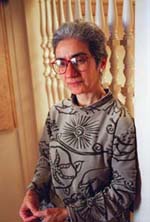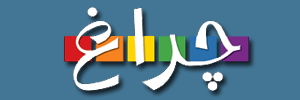|
Gay rights in Iran a complex battle, says
Iranian sexual identity expert
Harvard professor warns against pushing for gay
rights movement in
Iran
By Ashley Fitzpatrick
 Harvard professor
Afsaneh Najmabadi said Thursday night she wants Canadian and
international gay rights groups to be more careful in how they
present the situation of homosexuals and transsexuals in Iran.
Lecturing at Dalhousie University on “Transing and Transpassing
Along Sex-Gender Lines in Contemporary Iran,” Najmabadi presented
some conclusions from her most recent research to the nearly two
hundred people in attendance. Harvard professor
Afsaneh Najmabadi said Thursday night she wants Canadian and
international gay rights groups to be more careful in how they
present the situation of homosexuals and transsexuals in Iran.
Lecturing at Dalhousie University on “Transing and Transpassing
Along Sex-Gender Lines in Contemporary Iran,” Najmabadi presented
some conclusions from her most recent research to the nearly two
hundred people in attendance.
The state’s cultural stigmatization and restrictive policies have
done nothing to end homosexuality in Iran, according to Najmabadi.
In actual fact, she said, many homosexuals continue to live their
lives simply and quietly while searching for ways to ease the
pressures placed on them.
This would appear to contradict an address given at Columbia
University by Iranian president Mahmoud Ahmadinejad in September
2007. The address created a surge in English-language media coverage
concerning homosexuals in Iran after Ahmadinejad stated through a
translator that, “in Iran, we do not have homosexuals -- not like in
your country.”
Yet, according to Najmabadi, Iranian homosexuals are there, they’re
just not looking for a social movement. Instead, “most Iranians wish
to keep national and international politics out of their daily
lives.”
It will be difficult for Iranians to maintain that conservative
position however. Activist groups such as the International Gay and
Lesbian Human Rights Commission, HOMAN—the Iranian gay, lesbian,
bisexual and transgender organization and the Canadian-based Iranian
Queer Organization are all seeking changes in Iran that will both
openly acknowledge and encourage dialogue between homosexuals and
the Iranian leadership.
Facing violence and death
During her lecture, Najmabadi referred to the controversial Islamic
law that condemns homosexuals to lashings or death for having sex
with their same-sex partners but explained that it is nearly
impossible to prove, since it requires testimony from five male
witnesses.
“I don’t agree,” Iranian-born Arsham Parsi said in a phone interview
on Friday. Parsi is executive director of the Iranian Queer
Organization- a non-profit focused on helping “Iranian gay, lesbian,
bisexual and transgendered refugees all over the world,” according
to the group’s website. Parsi himself came to Canada in 2004 and has
been fighting for changes to Iranian capital punishment in cases of
homosexuality.
He has heard statements such as Najmabadi’s before.
“Unfortunately, they don’t know that in many of the cases we are
dealing with, the police are raiding homes with four or five
people.” These officers then act as witnesses and this allows for
serious convictions. Parsi also questions the legitimacy of some of
this police testimony. “Last May,” said Parsi, “police arrested 85
guys in a private party.”
The biggest problem, said Parsi, is that homosexuality is not
discussed. “Two days ago I received news from Iran that a person --
a man -- was arrested and faces execution.” Hoping to help, Parsi
contacted the man’s family, “but the family is not interested in
talking,” he said.
In 2006, Parsi sent a letter on behalf of the Iranian Queer
Organization to the United Nations objecting to the current
situation in Iran. Their main interest, Parsi said, is in keeping
the government and religious leaders out of Iranian bedrooms,
whether they belong to gay or straight couples.
Here Parsi noted that adulterous relationships are also open to
severe punishments. The real problem, Parsi said Friday, is that
right now “they can execute people on the basis of their sexual
relationship.”
Language barriers coming down, but no revolution yet
Despite these problems, homosexuals are not looking for a
revolution, Najmabadi said Thursday. She explained that it is
important for outside activist organizations that call for reforms
in Iran to take time to consider what repercussions there might be
for Iranians who join an outspoken gay movement. It is also
important, she said, that they consider the subtleties of Iranian
culture and language.
In
Iran,
“I am Gay,” said Najmabadi, “is not the same kind of identity
statement.” The English word “gay” is often used by homosexuals in
Iran because the Persian equivalents are so heavily negative. An
increasing use of these English words does not necessarily signal a
desire for an American-style gay movement.
“The foreignness of these words makes it possible to say something
about yourself that you cannot say in Persian,” said Najmabadi.
For now, even the most outspoken Iranians will have to fight their
battles under-the-radar. And Najmabadi and Parsi both admit that
there are no easy answers when it comes to being homosexual in
Iran.
“It’s complicated,” said Parsi, “It’s very, very complicated.”
Najmabadi's lecture was given as part
of the MacKay Lecture Series which is offered by the Dalhousie
Institute of Society and Culture. The lecture series brings in
experts from various fields to speak about topics that revolve
around a single theme. This year, the focus is on "Identities and
Ideologies: Changes and Transformations in the Modern Islamic
World."
|
 بازگشت به چراغ
37
بازگشت به چراغ
37